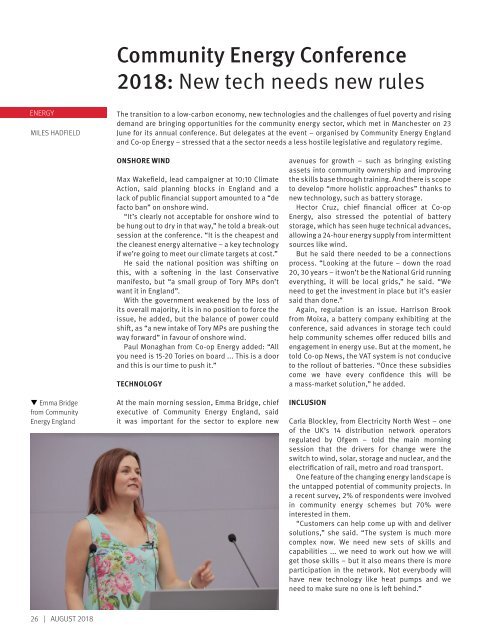AUGUST 2018
The August edition of Co-op News looks at how the co-operative movement can grow - but also thrive. Plus case studies from the US worker co-op movement, and how co-ops are embracing spoken word to tell the co-op story.
The August edition of Co-op News looks at how the co-operative movement can grow - but also thrive. Plus case studies from the US worker co-op movement, and how co-ops are embracing spoken word to tell the co-op story.
You also want an ePaper? Increase the reach of your titles
YUMPU automatically turns print PDFs into web optimized ePapers that Google loves.
Community Energy Conference<br />
<strong>2018</strong>: New tech needs new rules<br />
ENERGY<br />
MILES HADFIELD<br />
The transition to a low-carbon economy, new technologies and the challenges of fuel poverty and rising<br />
demand are bringing opportunities for the community energy sector, which met in Manchester on 23<br />
June for its annual conference. But delegates at the event – organised by Community Energy England<br />
and Co-op Energy – stressed that a the sector needs a less hostile legislative and regulatory regime.<br />
q Emma Bridge<br />
from Community<br />
Energy England<br />
ONSHORE WIND<br />
Max Wakefield, lead campaigner at 10:10 Climate<br />
Action, said planning blocks in England and a<br />
lack of public financial support amounted to a “de<br />
facto ban” on onshore wind.<br />
“It’s clearly not acceptable for onshore wind to<br />
be hung out to dry in that way,” he told a break-out<br />
session at the conference. “It is the cheapest and<br />
the cleanest energy alternative – a key technology<br />
if we’re going to meet our climate targets at cost.”<br />
He said the national position was shifting on<br />
this, with a softening in the last Conservative<br />
manifesto, but “a small group of Tory MPs don’t<br />
want it in England”.<br />
With the government weakened by the loss of<br />
its overall majority, it is in no position to force the<br />
issue, he added, but the balance of power could<br />
shift, as “a new intake of Tory MPs are pushing the<br />
way forward” in favour of onshore wind.<br />
Paul Monaghan from Co-op Energy added: “All<br />
you need is 15-20 Tories on board ... This is a door<br />
and this is our time to push it.”<br />
TECHNOLOGY<br />
At the main morning session, Emma Bridge, chief<br />
executive of Community Energy England, said<br />
it was important for the sector to explore new<br />
avenues for growth – such as bringing existing<br />
assets into community ownership and improving<br />
the skills base through training. And there is scope<br />
to develop “more holistic approaches” thanks to<br />
new technology, such as battery storage.<br />
Hector Cruz, chief financial officer at Co-op<br />
Energy, also stressed the potential of battery<br />
storage, which has seen huge technical advances,<br />
allowing a 24-hour energy supply from intermittent<br />
sources like wind.<br />
But he said there needed to be a connections<br />
process. “Looking at the future – down the road<br />
20, 30 years – it won’t be the National Grid running<br />
everything, it will be local grids,” he said. “We<br />
need to get the investment in place but it’s easier<br />
said than done.”<br />
Again, regulation is an issue. Harrison Brook<br />
from Moixa, a battery company exhibiting at the<br />
conference, said advances in storage tech could<br />
help community schemes offer reduced bills and<br />
engagement in energy use. But at the moment, he<br />
told Co-op News, the VAT system is not conducive<br />
to the rollout of batteries. “Once these subsidies<br />
come we have every confidence this will be<br />
a mass-market solution,” he added.<br />
INCLUSION<br />
Carla Blockley, from Electricity North West – one<br />
of the UK’s 14 distribution network operators<br />
regulated by Ofgem – told the main morning<br />
session that the drivers for change were the<br />
switch to wind, solar, storage and nuclear, and the<br />
electrification of rail, metro and road transport.<br />
One feature of the changing energy landscape is<br />
the untapped potential of community projects. In<br />
a recent survey, 2% of respondents were involved<br />
in community energy schemes but 70% were<br />
interested in them.<br />
“Customers can help come up with and deliver<br />
solutions,” she said. “The system is much more<br />
complex now. We need new sets of skills and<br />
capabilities ... we need to work out how we will<br />
get those skills – but it also means there is more<br />
participation in the network. Not everybody will<br />
have new technology like heat pumps and we<br />
need to make sure no one is left behind.”<br />
26 | <strong>AUGUST</strong> <strong>2018</strong>


















